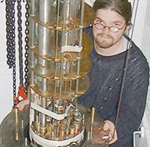Physics research in the UK is stronger than ever, according to the results of the 2001 research assessment exercise, which are announced today. Over 78% of academic physicists work in top-rated departments that contain research of "international excellence", compared with just 54% in the last exercise in 1996. Twenty-nine of the UK's 49 physics departments are doing research of a higher quality than five years ago, and 20 departments have maintained their standards. No department is doing worse than last time, although seven fewer physics departments were entered into the exercise than in 1996.

The RAE was carried out by 60 panels of experts, who monitored the quality of research in every university department in their field. Each department was awarded one of seven grades ranging from 1 (the lowest) to 5*, depending on how much of the work was judged to have reached “national” or “international” levels of excellence.
Five physics departments – Cambridge, Imperial, Lancaster, Oxford and Southampton – received a prestigious grade 5*, with Lancaster, Southampton and Imperial winning the top grade for the first time. Twenty-two departments were awarded a grade 5 – twice as many as in 1996 – while only 15 received a grade 4, down from 26 last time. Only seven departments were given the next lowest grade, compared with 13 in 1996.
The physics panel awarded its marks using a range of criteria, including the quality of at least four cited pieces of work submitted by every “research active” member of staff. Other factors included research income, numbers of post-docs and students, and time allocated for experiments at central facilities.
Qualitative factors such as the presence of high-profile departmental visitors and the award of major prizes also counted towards the final grade. The grades are used by the UK’s regional funding councils to work out how much money each university should receive to pay for labs, facilities and the salaries of permanent staff. The funding is skewed so that higher-rated departments receive more money.
But do the better grades reflect a genuine improvement in the quality of physics research or do departments simply know how to “play the game” by making submissions that stand more chance of scoring highly?
John Enderby of Bristol University, who chaired the physics panel, is convinced that standards have risen. “The quality of research in the UK is extremely high,” he says. “Everyone on the panel felt very comfortable that the grades we’d awarded were right. We also asked experts from outside the UK to look at departments rated 5 and 5* – and they agreed completely with our decisions.” Enderby adds that the threshold for a grade 4 has risen since the last RAE, which means that even those departments who remained on that grade have actually improved.
Research Assessment Exercise 2001
Departments are awarded one of seven grades: 1, 2, 3b, 3a, 4, 5, 5* (the highest).
| University | 2001 | 1996 |
| Aberystwyth | 4 | 4 |
| Armagh Observatory | 4 | 4 |
| Bath | 4 | 4 |
| Birmingham | 5 | 5 |
| Brighton | 3a | 1 |
| Bristol | 5 | 5 |
| Cambridge | 5* | 5* |
| Cardiff | 5 | 4 |
| Central Lancashire | 4 | 3a |
| City | 4 | – |
| Durham | 5 | 5 |
| Edinburgh | 5 | 5 |
| Exeter | 5 | 4 |
| Glasgow | 5 | 4 |
| Heriot-Watt | 4 | 4 |
| Hertfordshire | 4 | 4 |
| Imperial College | 5* | 5 |
| Keele | 3a | 3a |
| Kent | 3a | 3a |
| King’s College London | 4 | 4 |
| Lancaster | 5* | 3a |
| Leeds | 5 | 5 |
| Leicester | 5 | 5 |
| Liverpool | 5 | 5 |
| Liverpool John Moores | 4 | 4 |
| Loughborough | 4 | 3a |
| Manchester | 5 | 5 |
| Newcastle a | 4 | 4 |
| Nottingham | 5 | 4 |
| Open | 3a | 3b |
| Oxford | 5* | 5* |
| Paisley | 3a | 1 |
| Plymouth | 3a | – |
| Queen Mary | 5 | 4 |
| Queen’s Belfast | 5 | 5 |
| Reading | 4 | 4 |
| Royal Holloway | 5 | 4 |
| Sheffield b | 5 | 4 |
| Sheffield Hallam | 3a | – |
| Southampton | 5* | 4 |
| St Andrews | 5 | 4 |
| Strathclyde c | 4 | 4 |
| Surrey | 5 | 4 |
| Sussex | 5 | 3a |
| Swansea | 5 | 4 |
| UMIST | 4 | 4 |
| University College London | 5 | 5 |
| Warwick | 5 | 4 |
| York | 4 | 4 |
Notes
a: Surface, nanoscale science and technology group “flagged” by the physics panel – i.e. considered to be at least two points above the overall departmental grade.
b: Sheffield result for physics and astronomy; it also received a grade 5 for medical physics and clincial engineering.
c: Computational non-linear and quantum optics group flagged.



